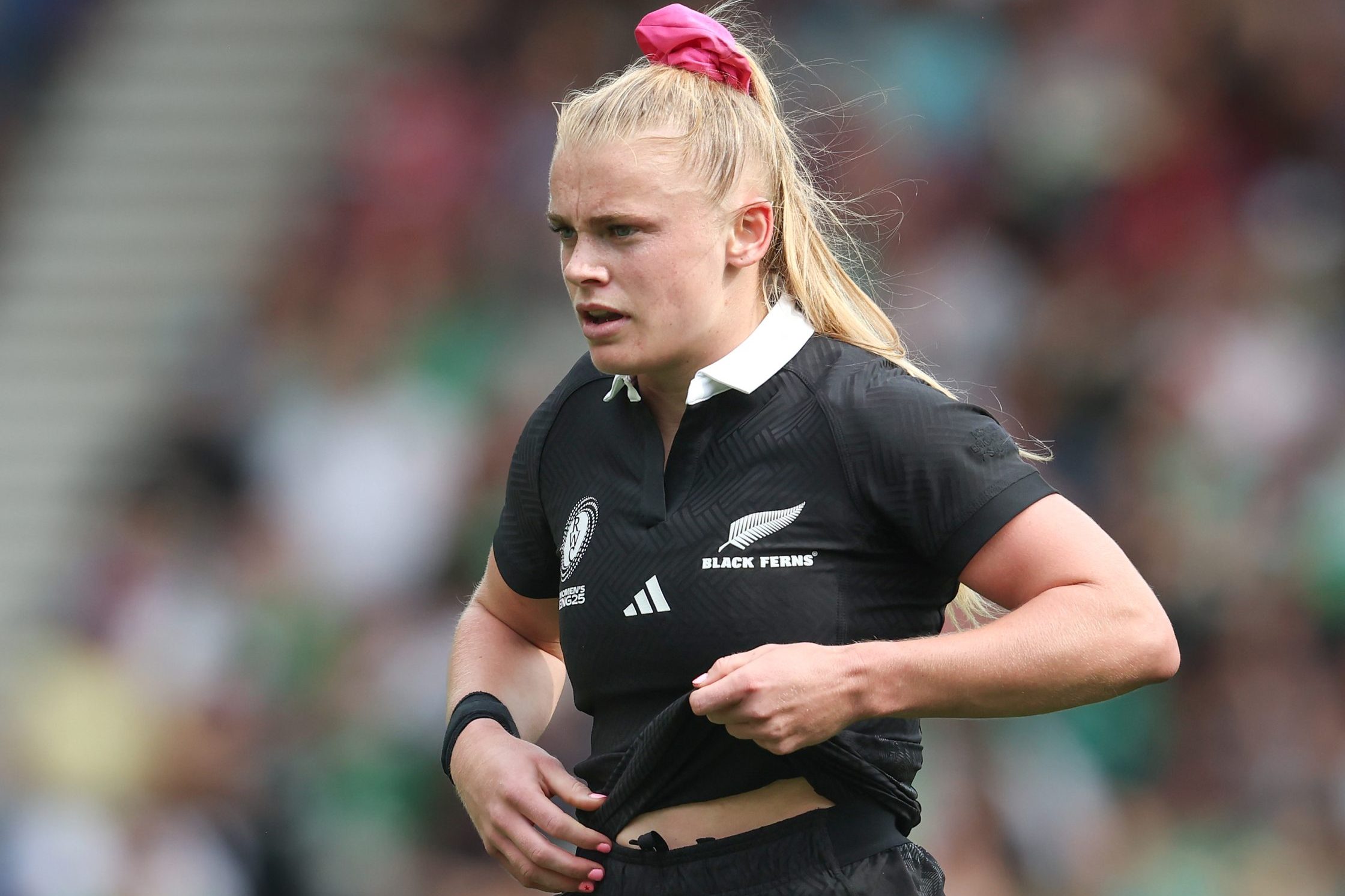By Adam Julian
Copyright newsroom

Jorja Miller was officially recognised as the best rugby player in New Zealand last year when she won the Kelvin Tremain Memorial Trophy. The 21-year-old flanker has been one of the outstanding players in this World Cup, scoring four tries and successfully completing 37 of the 39 tackles she attempted.
Unfortunately, Miller will miss the semifinal because of what appears to be a hamstring injury suffered during the quarterfinal against South Africa.
When Black Ferns Director of Rugby Alan Bunting was asked about the injury, he stated that Miller had “requested privacy regarding the injury.” When pressed about her availability for the final, he simply replied, “Question answered; we’ll move on.”
This response is unusual for the Black Ferns, who typically maintain a transparent, even jovial relationship with the press. Silence breeds speculation, and such an answer might inadvertently create more distractions than those already present from Miller’s status in the game.
In the 2011 Rugby World Cup, when the All Blacks’ two best players, Dan Carter and Richie McCaw, were injured, there was no “request for privacy.” Additionally, in Super Rugby Pacific this year, official injury lists were published after each round to help avoid the type of rumours the Black Ferns now face.
Miller’s injury is a significant blow. She has the ability to change the game at any moment with her predator instincts and dynamism. The good news is the Black Ferns have 13 survivors from their Rugby World Cup 2022 semifinal victory against France.
Miller has been replaced at openside flanker by Kennedy Tukuafu in her 34th Test match. The 2021 Black Ferns Player of the Year from Waikato has seen limited action in this Rugby World Cup and is all business.
“Jorja is an incredible player, but we haven’t felt her absence. She’s helping the team in different ways. It’s a real honour to start. I’ve been trusted to do a job, and that’s exactly what I’ll do,” Tukuafu said.
Experience is prioritised at tighthead prop, where Tanya Kalounivale, in her 25th Test, replaces Veisinia Mahutariki-Fakalelu, who made a mammoth 25 tackles against South Africa.
Two-time Black Ferns Sevens Olympic gold medalist Risi Pouri-Lane comes in at scrum-half, while Maia Joseph drops to the replacements bench.
Theresa Setefano, 23-0 in Test rugby, is also on the bench as Sylvia Brunt returns from injury at second five-eighths. Brunt was Player of the Match against Ireland, and her presence in midfield enhances the potency of the Black Ferns’ attack. At only 21, Brunt has already played 27 Test matches, winning 20 and scoring 11 tries.
Amy Rule, Chelsea Bremner, Layla Sae, and Ayesha Leti-I’iga, who is celebrating her milestone 30th test, headline the bench. Leti-I’iga has scored 21 tries, including the winning try in the 2022 Rugby World Cup, and has enjoyed 21 victories in the Black jersey.
Eight starters from the 27-27 draw between NZ and Canada in May are returning, including hooker Georgia Ponsonby, who has played 35 internationals.
“With Canada, I wouldn’t put numbers on individuals. They’re a clinical team, hard workers who all do their roles well,” Ponsonby said.
“The lineout, rolling maul, and special plays around that are a big part of their game. If we can be better disciplined—discipline has let us down a bit in the tournament—we can take away one of their major threats.”
Confident Canada
Since Canada defeated France 29-20 in their last match of WXV 1 on November 4, 2023, they have lost only one of their last 17 internationals, with a lone narrow loss to England in the WXV 1 2024 final in Vancouver.
In May 2024, Canada achieved a historic victory over the Black Ferns, winning 22-19 in Christchurch. This marked their first win against New Zealand in 17 encounters, despite trailing 14-3 at one point. Canada showed remarkable resilience in the match, making 247 tackles compared with New Zealand’s 101. Winger Fancy Bermudez scored two tries, while Sophie De Goode contributed a herculean 27 tackles.
In May 2025, an 83rd-minute try from Sylvia Brunt salvaged a 27-27 draw for the Black Ferns against Canada. The progression of the score illustrates the closely contested nature of the contest: New Zealand initially led 7-0, but Canada responded to level it at 7-7. The scores, with the Black Ferns total listed first, progressed as follows: 12-7, 12-12, 19-12, 19-17, 19-22, 22-22, 22-27, and finally 27-27.
At this Rugby World Cup, Canada has convincingly dispatched Fiji (65-7), Wales (42-0), Scotland (40-19), and Australia (46-5).
Following their quarterfinal rout of the Wallaroos, The Guardian noted: “Expansive attacking rugby? Tick. Pick-and-go tries? Tick. Impressive defence and holding up tries? Tick. Canada’s performance underlined why they are among the tournament favourites and set up a thrilling semifinal against New Zealand.”
Canada remains unchanged from their match against Australia. Some of their talismanic players include No. 8 and goalkicker De Goode, the John Eales of women’s rugby, who has recently returned in commanding form after recovering from an ACL injury. Both of Sophie’s parents, Stephanie and Hans, also captained Canada.
Evergreen openside flanker Karen Paquin celebrates her 50th Test at the age of 38. She was immense in Canada’s narrow 26-19 loss to England in the 2022 Rugby World Cup semifinal.
Fullback Julia Schell has the ability to capture lightning in a bottle; she scored six tries in a 22-minute span against Fiji in the opening round.
Alysha Corrigan, Florence Symonds, Asia Hogan-Rochester, Caroline Crossley, and Olivia Apps were all part of Canada’s sevens squad that claimed silver at last year’s Paris Olympics, narrowly losing 19-12 in the final to the Black Ferns Sevens.
Interestingly, Canada is still regarded by many as an underdog, a perception that 36-test prop McKinley Hunt has acknowledged.
“It’s the classic situation; we’re second in the world, yet we’re still labelled as underdogs,” Hunt stated. “It’s just something we have to brush off. Labels aren’t always accurate, so if that’s how they want to perceive us, we’ll accept it.”
In March, Canada launched a crowdfunding campaign with a goal of raising C$1 million (NZ$1.22 million) under the title “Mission: Win the Rugby World Cup 2025.” Rugby Canada announced they were “95 percent of the way” there on the tournament’s eve, with all donations funding their preparations toward their dream of winning their first World Cup.
Fifty for Lu
Black Ferns co-captain Ruahei ‘Lu’ Demant (Te Whānau-ā-Apanui, Te Whakatōhea, Ngāti Awa) will become just the third Black Fern, following Kendra Cocksedge and Fiao’o Fa’amausili, to play 50 Tests for the side on Friday night.
Before her impressive 2,619-day tenure as a Black Fern began with a 31-11 victory over Australia in Sydney on August 18, 2018, she had already recovered from two ACL injuries.
In her remarkable seven-year career, she has transitioned from a talented second five-eighth to what Sir Wayne Smith, the coach of the 2022 Rugby World Cup-winning team, describes as the “Daniel Carter of women’s rugby.”
Following the humiliating 2021 Northern Tour, during which record defeats were suffered against France and England, Smith made the bold decision to appoint Lu as his captain. Six months later, the Black Ferns became World Champions.
“At three-quarter time of a practice match, I heard her say: ‘What are you scared of, girls? Where’s your courage to have a crack?’ That aligned perfectly with the fearless, expansive style of play I was trying to instil, which complements the Black Ferns’ DNA,” Smith said.
“I believe her general kicking has improved, making her an even more dangerous key player. She is one of the smartest athletes, best communicators, and most balanced in both attack and defence that I’ve ever coached.”
Demant was named Player of the Match in the Black Ferns’ improbable 34-31 victory over England in the 2022 World Cup final. England had won a world record 30 consecutive Test matches and held a 14-0 lead in the final within minutes.
More accolades followed: she was named World Rugby Women’s 15s Player of the Year and became only the third woman, alongside her teammates Cocksedge and Sarah Hirini, to win New Zealand Rugby’s top prize, the Kelvin R. Tremain Memorial Player of the Year.
She also received the Black Ferns’ Player of the Year award, the Tom French Memorial Māori Player of the Year award, and the New Zealand Rugby Players’ Association Player of the Year award, as voted by her peers. The Black Ferns went on to win Team of the Year at the Halberg Awards.
Demant has consistently maintained high standards, adding two Pacific Four and three Laurie O’Reilly Cups to her accomplishments. Domestically, she won an FPC Premiership with Auckland in 2023 and two Super Rugby Aupiki titles with the Blues in 2024 and 2025.
Perhaps the best measure of an outstanding captain is her ability to bring out the best in those who are completely different from her. Hooker Georgia Ponsonby, a forward from a very different background, shared her thoughts about Lu.
“Words don’t do Lu justice. She is the best leader I’ve ever encountered in any aspect of life—so calm, kind, and trustworthy. She communicates clearly and directly, providing solutions, and if those solutions don’t exist, she’ll go and find them.
“Lu is an incredibly smart rugby player, quick to identify and capitalise on space. She is hardworking and dedicated. I feel very safe when Lu is with me.”



